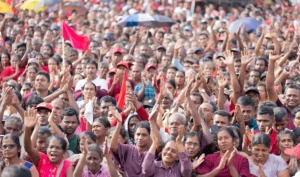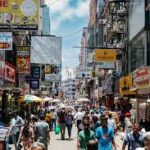
Wide Angle focus on President Dissanayake’s Strategic Move: Dissolving Parliament to Capitalize on Presidential Victory
- CNL Reporter
- November 10, 2024
- Weekly Political Review
- Dissolving Parliament, Parliament, President Dissanayake
- 0 Comments
Weekly Political Review
Sri Lanka’s Parliamentary Elections: A Tense Contest for the Future of Governance
By Rohana Jith
In a significant political move, President Anura Kumara Dissanayake opted to dissolve Sri Lanka’s Parliament shortly after his victory in the presidential elections on September 21, 2024.
The national legislature was officially dissolved on September 24, with new parliamentary elections scheduled for November 14, 2024.
This strategic decision is not uncommon in Sri Lankan politics, as newly elected presidents often dissolve Parliament to ride the wave of the euphoria generated by their victory, hoping to consolidate their mandate and secure a fresh majority.
The Sri Lanka Podujana Peramuna (SLPP), which won a two-thirds majority in 2020, had also used a similar strategy in the past.
This time, however, the political landscape is markedly different, with the Janatha Vimukthi Peramuna (JVP)-led National People’s Power (NPP) alliance poised to become the dominant force in Parliament.
While it is widely expected that the JVP/NPP will emerge as the largest party, questions remain about whether they can secure a clear majority of 113 seats in the 225-member legislature.
The JVP/NPP: Rising Popularity, But Can They Win a Majority?
The JVP/NPP, which gained substantial support during the presidential election, is anticipated to win a significant number of parliamentary seats.

However, even if their presidential votes are translated directly into parliamentary seats, the JVP/NPP is likely to fall short of an outright majority, with an estimated 110 seats—just three shy of the critical 113 needed for control.
Despite this, the party’s leaders have signaled that they are not aiming for a two-thirds majority, further tempering expectations.
Supporters of the JVP/NPP, however, remain optimistic, asserting that the party will dominate the elections, arguing that there is no strong opposition capable of challenging their growing influence.
A fractured opposition, they claim, will struggle to unite and pose a meaningful challenge to the JVP/NPP’s ascendance. Moreover, there are expectations that voter turnout could be lower in rural areas, which would favor the JVP/NPP, given their significant rural support base.
Electoral Dynamics: Fragmented Opposition and Potential Shifts in Voter Sentiment
One of the key issues highlighted by JVP/NPP supporters is the fragmented nature of the opposition. The opposition parties are struggling to mount a unified challenge to the JVP/NPP, with votes likely to be split across several parties.
Furthermore, many rural voters are not entirely satisfied with the new administration, which has yet to fulfill all its campaign promises. Despite this, they remain willing to give the government more time, especially since the opposition remains disorganized and ineffective.
The upcoming election will feature over 8,800 candidates vying for the 225 parliamentary seats. The JVP/NPP has already identified its key candidates and is expected to push for those who will align with the party’s agenda.
However, some opposition voices are concerned about the JVP/NPP’s ambitions to secure a two-thirds majority, which could enable them to amend the constitution and consolidate power further, creating what they fear could become a de facto one-party state.
JVP/NPP’s Image: Socialist Roots and Economic Vision
While the JVP/NPP’s leaders have worked to present themselves as advocates of change, they have made efforts to distance themselves from their Marxist-Leninist past.
Despite retaining the red and yellow hammer and sickle flag as a symbol, they are now promoting a more socially democratic image, one that accepts the private sector as a key driver of economic growth, rather than relying entirely on state-owned enterprises.
This shift is aimed at reassuring voters that their economic policies will not be overly radical. Nevertheless, their critics, particularly the opposition, continue to argue that the election represents a choice between radical left-wing socialism and free-market conservatism, but this debate has failed to capture the electorate’s attention in a meaningful way.
One of the most contentious issues in Sri Lanka’s recent political discourse has been the lack of electoral reforms. The previous Parliament failed to pass meaningful electoral reforms that would have introduced a hybrid system combining proportional representation with the first-past-the-post method.
This failure to modernize the electoral system has contributed to dissatisfaction with the political process, as voters feel disconnected from their elected representatives.
The Challenges Facing the JVP/NPP: Economic Issues and Governance Concerns
Despite the strong electoral prospects, the JVP/NPP’s new government faces several challenges. The most significant of these is its inability to introduce substantial policy changes or address pressing economic issues.
After President Dissanayake’s election victory, many of his supporters had expected immediate reforms, but the new administration has largely continued the policies of its predecessors. For instance, the government has maintained the controversial IMF bailout agreement, continued efforts to seek BRICS membership, and adhered to the fuel price formula set by previous administrations.
There are three main reasons why the government has not yet introduced significant changes. First, the government is inexperienced, with a small cabinet consisting of only three ministers, all from the JVP/NPP, due to the party’s limited representation in the previous Parliament.
The JVP/NPP has also been reluctant to form coalitions with other parties, as they view other political actors as corrupt. This has left the government without the support or resources needed to enact large-scale reforms.
Second, the government may be hesitant to make drastic changes due to fears that doing so could trigger another economic crisis, reminiscent of the one caused by President Gotabaya Rajapaksa in 2022. Given the high expectations surrounding the new administration, any missteps could have serious repercussions.
Third, the government may be waiting until after the parliamentary elections to implement structural reforms. With considerable public support, the administration may prefer to consolidate its power in Parliament first before making bold moves.
Internal Tensions and Potential Vote Losses
While the JVP/NPP remains the favorite to win the election, there are several factors that could erode their vote share. For instance, the rising presence of Israeli nationals in Sri Lanka has raised concerns among the Muslim community, who supported Dissanayake during the presidential election. This issue, combined with the government’s inability to control rising prices of essential goods like rice, coconut, and fuel, could potentially alienate some voters.
Additionally, the JVP/NPP’s recent performance in local elections, such as in Elpitiya, suggests that while the party is making gains, their support is not as robust as expected. The results in Elpitiya, a predominantly Sinhala region, saw a slight decline in the JVP/NPP’s vote share, which could be a warning sign that their appeal may not be as widespread as it appears.
Conclusion: A Hung Parliament or a JVP/NPP Victory?
Given the current dynamics, the most likely outcome of the November 14 election is a hung parliament, with the JVP/NPP emerging as the largest party but falling short of an outright majority.
The opposition, although fragmented, could still play a significant role in shaping the future of Sri Lanka’s government. As the country heads into this crucial election, the key question will be whether the JVP/NPP can turn their current momentum into a clear parliamentary majority, or whether the opposition can find a way to challenge their dominance. Regardless of the outcome, the election will undoubtedly be a pivotal moment in Sri Lanka’s political history.

